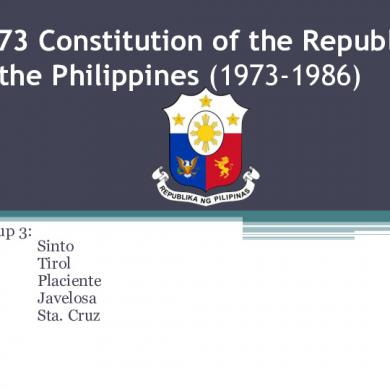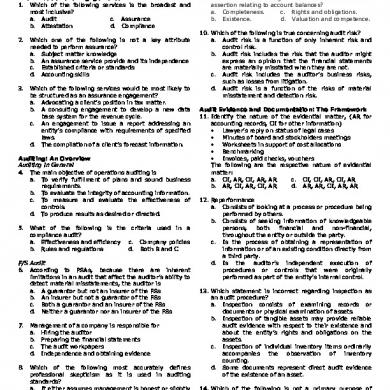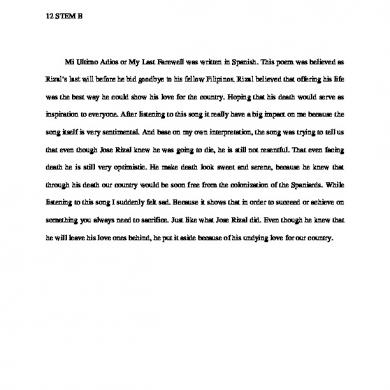1973-constitution-of-the-republic-of-the-philippines.pptx
This document was uploaded by user and they confirmed that they have the permission to share it. If you are author or own the copyright of this book, please report to us by using this DMCA report form. Report DMCA
Overview
Download & View 1973-constitution-of-the-republic-of-the-philippines.pptx as PDF for free.
More details
- Words: 599
- Pages: 11
Loading documents preview...
1973 Constitution of the Republic of the Philippines (1973-1986)
Group 3:
Sinto Tirol Placiente Javelosa Sta. Cruz
1973 Constitution of the Philippines • The 1973 Constitution , composed of a preamble and 17 articles, provides for the shift from presidential to parliamentary system of government. The Constitution vests the legislative power in the National Assembly. A Prime Minister is elected from among the members of the National Assembly and serves as the head of government and commander-in-chief of the Philippine Armed Forces. A President is elected from among the members of the National Assembly and serves as the symbolic head of state with a six-year term. The judicial power is vested in the Supreme Court, composed of a Chief Justice and 14 Justices. The National Assembly exercises the power to define, prescribe and apportion the jurisdiction of the lower courts. All justices of the Supreme Court and judges of the lower courts are appointed by the Prime Minister.
• This Constitution retains the independence of the Commission on Elections and establishes two independent Constitution al bodies [Civil Service Commission and the Commission on Audit] as well as the National Economic Development Authority [NEDA].
1973 PREAMBLE • We, the sovereign Filipino people, imploring the aid of Divine Providence, in order to establish a Government that shall embody our ideals, promote the general welfare, conserve and develop the patrimony of our Nation, and secure to ourselves and our posterity the blessings of democracy under a regime of justice, peace, liberty, and equality, do ordain and promulgate this Constitution.
The 1973 Constitution Ratified on January 17, 1973 • Features: • A.) Establishment of a modified parliamentary government. • B.) Suspension of the Bill Rights • C.) Has given greater power to the Executive Department (In accordance with Presidential Proclamation No. 1102 issued by President Ferdinand E. Marcos)
ARTICLE I: The National Territory (1 Section) ARTICLE II: Declaration of Principles and State Policies (10 Sections) ARTICLE III: Citizens (4 Sections) ARTICLE IV: Bill of Rights (23 Sections) ARTICLE V: Duties &Obligations of Citizens (4 Sections) ARTICLE VI: Suffrage (1 Section) ARTICLE VII: The President & Vice- President (7 Section) ARTICLE VIII: The National Assembly ( 20 Sections)
ARTICLE IX: The Prime Minister & The Cabinet (16 Sections) ARTICLE X: The Judiciary (12 Sections) ARTICLE XI: Local Government (5 Sections) ARTICLE XII: The Constitutional Commissions A. Common Provisions ( 4 Sections) B. The Civil Service Commission ( 6 Sections) C. The Commission on Elections (11 Sections) D. Commission on Audit (2 Sections)
ARTICLE XIII: Accountability of the Public Officers(6 Sections) ARTICLE XIV: The National Economy and the Patrimony of the Nation ( 15 Sections) ARTICLE XV: General Provisions (16 Sections) ARTICLE XVI: Amendments (2 Sections) ARTICLE XVII: Transitory Provisions ( 16 Sections)
Duties and Obligations of Citizens • Section 1. It shall be the duty of the citizen to be loyal to the Republic and to honor the Philippine flag, to defend the State and contribute to its development and welfare, to uphold the Constitution and obey the laws, and to cooperate with the duly constituted authorities in the attainment and preservation of a just and orderly society.
• Section 2. The rights of the individual impose upon him the correlative duty to exercise them responsibly and with due regard for the rights of others. • Section 3. It shall be the duty of every citizen to engage in gainful work to assure himself and his family a life worthy of human dignity.
• 4. It shall be the obligation of every citizen qualified to vote to register and cast his vote.
THANK YOU!!!
Group 3:
Sinto Tirol Placiente Javelosa Sta. Cruz
1973 Constitution of the Philippines • The 1973 Constitution , composed of a preamble and 17 articles, provides for the shift from presidential to parliamentary system of government. The Constitution vests the legislative power in the National Assembly. A Prime Minister is elected from among the members of the National Assembly and serves as the head of government and commander-in-chief of the Philippine Armed Forces. A President is elected from among the members of the National Assembly and serves as the symbolic head of state with a six-year term. The judicial power is vested in the Supreme Court, composed of a Chief Justice and 14 Justices. The National Assembly exercises the power to define, prescribe and apportion the jurisdiction of the lower courts. All justices of the Supreme Court and judges of the lower courts are appointed by the Prime Minister.
• This Constitution retains the independence of the Commission on Elections and establishes two independent Constitution al bodies [Civil Service Commission and the Commission on Audit] as well as the National Economic Development Authority [NEDA].
1973 PREAMBLE • We, the sovereign Filipino people, imploring the aid of Divine Providence, in order to establish a Government that shall embody our ideals, promote the general welfare, conserve and develop the patrimony of our Nation, and secure to ourselves and our posterity the blessings of democracy under a regime of justice, peace, liberty, and equality, do ordain and promulgate this Constitution.
The 1973 Constitution Ratified on January 17, 1973 • Features: • A.) Establishment of a modified parliamentary government. • B.) Suspension of the Bill Rights • C.) Has given greater power to the Executive Department (In accordance with Presidential Proclamation No. 1102 issued by President Ferdinand E. Marcos)
ARTICLE I: The National Territory (1 Section) ARTICLE II: Declaration of Principles and State Policies (10 Sections) ARTICLE III: Citizens (4 Sections) ARTICLE IV: Bill of Rights (23 Sections) ARTICLE V: Duties &Obligations of Citizens (4 Sections) ARTICLE VI: Suffrage (1 Section) ARTICLE VII: The President & Vice- President (7 Section) ARTICLE VIII: The National Assembly ( 20 Sections)
ARTICLE IX: The Prime Minister & The Cabinet (16 Sections) ARTICLE X: The Judiciary (12 Sections) ARTICLE XI: Local Government (5 Sections) ARTICLE XII: The Constitutional Commissions A. Common Provisions ( 4 Sections) B. The Civil Service Commission ( 6 Sections) C. The Commission on Elections (11 Sections) D. Commission on Audit (2 Sections)
ARTICLE XIII: Accountability of the Public Officers(6 Sections) ARTICLE XIV: The National Economy and the Patrimony of the Nation ( 15 Sections) ARTICLE XV: General Provisions (16 Sections) ARTICLE XVI: Amendments (2 Sections) ARTICLE XVII: Transitory Provisions ( 16 Sections)
Duties and Obligations of Citizens • Section 1. It shall be the duty of the citizen to be loyal to the Republic and to honor the Philippine flag, to defend the State and contribute to its development and welfare, to uphold the Constitution and obey the laws, and to cooperate with the duly constituted authorities in the attainment and preservation of a just and orderly society.
• Section 2. The rights of the individual impose upon him the correlative duty to exercise them responsibly and with due regard for the rights of others. • Section 3. It shall be the duty of every citizen to engage in gainful work to assure himself and his family a life worthy of human dignity.
• 4. It shall be the obligation of every citizen qualified to vote to register and cast his vote.
THANK YOU!!!
More Documents from "Mae Placiente"

1973-constitution-of-the-republic-of-the-philippines.pptx
February 2021 0
1 - Irrigation & Drainage Review Class 2012
January 2021 1
At.cdrill9_simulated-examination-diy.pdf
March 2021 0
Mi Ultimo Adios Reflection
January 2021 1
Araneta V Gatmaitan
February 2021 0